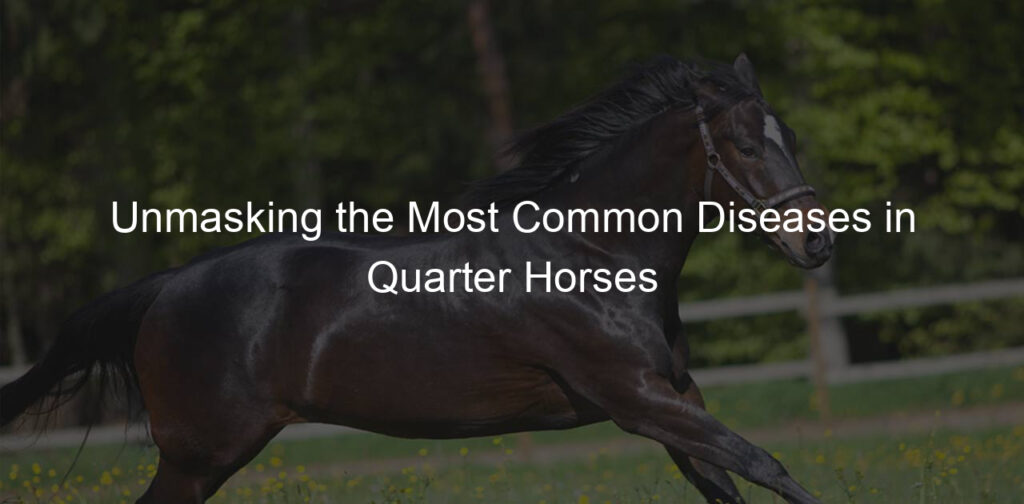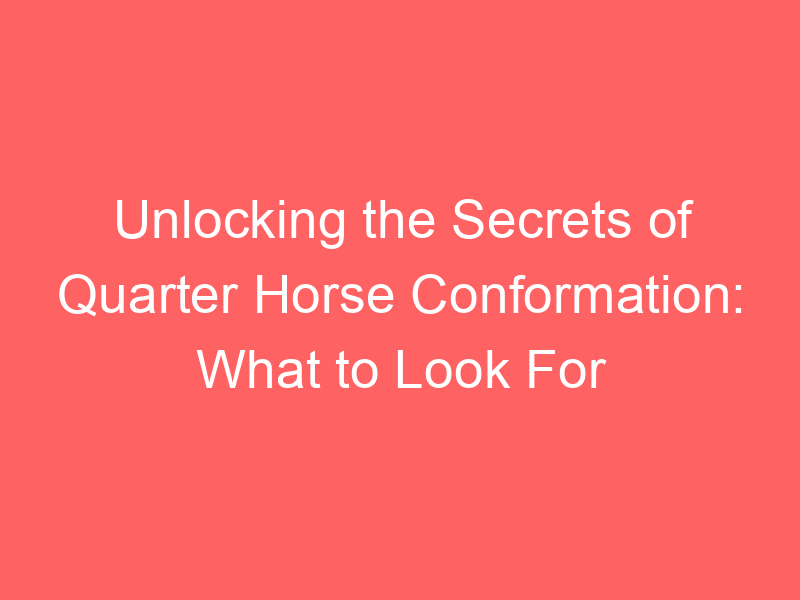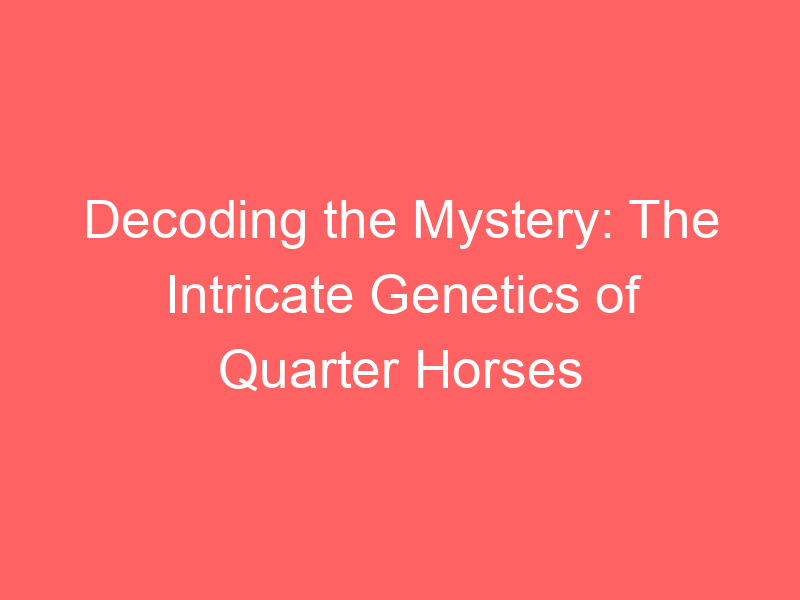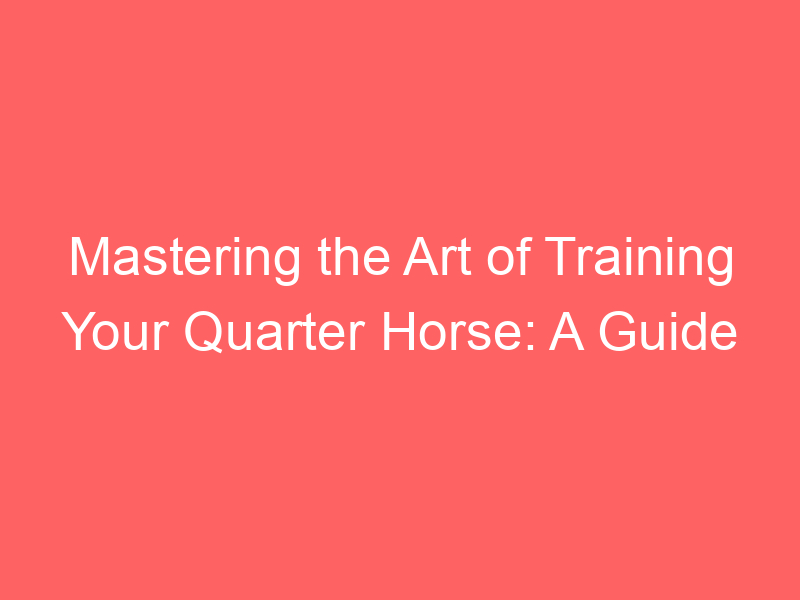Introduction to Quarter Horse Health Issues
Welcome to our blog post about Quarter Horse health issues! We all love our horses and want them to be healthy and happy. That’s why it’s important to understand the specific health concerns that can affect our beloved Quarter Horses. So, let’s dive in and learn more about equine health and the specific health issues that Quarter Horses can face.
- Understanding the Importance of Equine Health
- Specific Health Concerns for the Quarter Horse Breed
First things first, let’s talk about why equine health is so important. Horses, just like us humans, can get sick. And when they do, it can be really tough on them. They might not be able to run or play like they used to, or they might even feel pain. That’s why it’s so important to keep our horses healthy. A healthy horse is a happy horse!
Now, let’s talk about some of the specific health issues that can affect Quarter Horses. These horses are known for their speed and agility, but they can also be prone to certain health problems. Some of these include lameness, respiratory issues, and genetic diseases like Polysaccharide Storage Myopathy (PSSM). But don’t worry, with the right care and attention, these issues can be managed and your Quarter Horse can live a long, happy life.
Remember, the key to keeping your Quarter Horse healthy is regular check-ups with your vet, a balanced diet, and plenty of exercise. So, let’s keep our horses healthy and happy together!
Common Illnesses in Quarter Horses
Equine Infectious Anemia (EIA)
- Overview of EIA
Equine Infectious Anemia, or EIA, is a viral disease that affects horses. It’s often called “swamp fever” because it’s transmitted by bloodsucking insects like mosquitoes and horseflies. The virus can cause mild to severe symptoms, including fever, weakness, weight loss, and even sudden death. It’s a serious disease because once a horse is infected, it remains a carrier for life. Learn more about EIA here.
- Prevention and treatment
There is no cure for EIA, so prevention is key. This includes regular testing, controlling insect populations, and isolating infected horses. If a horse tests positive for EIA, it must be permanently identified and isolated to prevent the spread of the disease. While there is no specific treatment, supportive care can help manage symptoms and improve the horse’s quality of life. Remember, prevention is always better than cure!
Equine Herpesvirus (EHV)
Just like humans, horses can also get sick. One common illness that affects horses, including Quarter Horses, is the Equine Herpesvirus, or EHV for short. Let’s dive into understanding this virus and how we can prevent it from affecting our beloved horses.
- Understanding EHV
- Methods of prevention and control
EHV is a type of virus that can cause different illnesses in horses. It’s kind of like how a cold or flu virus can make us humans feel sick. There are different types of EHV, but the most common ones are EHV-1 and EHV-4. EHV-1 can cause respiratory disease, abortions in pregnant mares, and even neurological disease. On the other hand, EHV-4 usually causes respiratory disease but can occasionally cause abortion. It’s important to know that EHV can spread from horse to horse, especially if they’re in close contact. Learn more about EHV on Wikipedia.
Now that we know what EHV is, let’s talk about how we can prevent and control it. First, it’s important to isolate any horse that is showing signs of EHV. This is because the virus can spread from horse to horse. Second, cleanliness is key! Regularly cleaning and disinfecting the horse’s environment can help prevent the spread of the virus. Lastly, there are vaccines available that can help protect against EHV. However, these vaccines may not prevent all cases of the disease, so it’s important to talk to a vet about the best options for your horse.
Remember, the health of our Quarter Horses is very important. By understanding illnesses like EHV and knowing how to prevent them, we can help our horses live long and healthy lives.
Genetic Diseases in Quarter Horses
One of the most important aspects of caring for Quarter Horses is understanding their unique health needs. This includes being aware of genetic diseases that can affect this breed. Today, we’re going to talk about a condition called Hyperkalemic Periodic Paralysis, or HYPP for short.
Hyperkalemic Periodic Paralysis (HYPP)
HYPP is a genetic disease that affects the muscles of Quarter Horses. It’s a serious condition, but with the right knowledge and care, horses with HYPP can lead healthy and happy lives.
- Explaining HYPP
- Management and care for horses with HYPP
HYPP is a disease that causes horses to have sudden episodes of muscle weakness or paralysis. These episodes can be scary, but they usually don’t last very long. HYPP is caused by a mutation in a gene that controls how muscles function. This mutation makes the muscles overly sensitive to potassium, a mineral that’s important for muscle function. When a horse with HYPP has too much potassium in its body, it can trigger an episode of paralysis.
Caring for a horse with HYPP involves managing its diet and monitoring for signs of an episode. Horses with HYPP should be fed a low-potassium diet to help prevent episodes. This means avoiding feeds that are high in potassium, like alfalfa hay, and instead feeding them grass hay and grains. It’s also important to provide plenty of fresh water and regular exercise, as these can help keep potassium levels in check.
If a horse with HYPP does have an episode, it’s important to stay calm and call a vet immediately. The vet may be able to give the horse medication to help stop the episode and prevent future ones. With the right care, horses with HYPP can live long and healthy lives.
Remember, knowledge is power when it comes to caring for your Quarter Horse. By understanding HYPP and how to manage it, you can help your horse live a happy and healthy life.
Polysaccharide Storage Myopathy (PSSM)
Hey there, horse lovers! Today, we’re going to chat about a health issue that can affect our beloved Quarter Horses. It’s called Polysaccharide Storage Myopathy, or PSSM for short. Let’s break it down into bite-sized pieces so it’s easy to understand, okay?
- Understanding PSSM
- Treatment and management strategies
PSSM is a muscle disorder that affects horses. Imagine if your muscles couldn’t get the energy they needed to work properly. That’s what happens with PSSM. The horse’s body stores too much sugar (polysaccharides) in their muscles, and this can cause pain and stiffness. It’s like trying to run a race after eating a huge candy bar – not fun!
Some signs that a horse might have PSSM include muscle stiffness, reluctance to move, and even episodes of collapse. It’s a genetic disease, which means a horse can inherit it from its parents. Wikipedia has some more detailed information if you’re interested.
Now, let’s talk about how we can help horses with PSSM. There’s no cure, but there are ways to manage the condition. The main strategy is a special diet. Horses with PSSM need a low-sugar diet. It’s like when your parents tell you not to eat too many sweets – same idea!
Regular, gentle exercise is also important. It helps the horse’s muscles use up the stored sugar. Think of it like going for a walk after a big meal. It helps you feel better, right? It’s the same for horses with PSSM.
And of course, regular check-ups with the vet are super important. They can monitor the horse’s condition and make sure the treatment plan is working. Remember, every horse is unique, so what works for one might not work for another.
So, that’s PSSM in a nutshell. It’s a tough condition, but with the right care and management, horses with PSSM can lead happy, healthy lives. Keep loving and caring for your horses, folks!
Common Horse Diseases Affecting All Breeds
Laminitis
Hey there, horse lovers! Today, we’re going to chat about a common horse disease that can affect all breeds, including our beloved Quarter Horses. This disease is called Laminitis.
- Overview of Laminitis
- Prevention and Treatment in Quarter Horses
- Make sure your horse has a balanced diet. Too much grain or grass can lead to laminitis, so it’s important to monitor what your horse eats.
- Regular exercise is key. This helps keep your horse’s weight in check and promotes good overall health.
- Regular hoof care is also important. This includes regular trimming and shoeing by a professional farrier.
Laminitis is a serious condition that affects a horse’s hooves. It happens when the laminae – the tissues that connect the horse’s hoof to the bone inside – get inflamed. This can cause severe pain and make it hard for the horse to walk. In some severe cases, it can even cause permanent damage to the horse’s hooves.
There are many things that can cause laminitis, like eating too much grain or grass, standing on hard ground for too long, or even stress. It’s a tricky disease because it can sneak up on you – one day your horse seems fine, and the next day they’re limping and in pain.
But don’t worry, there are ways to prevent and treat laminitis in Quarter Horses. Prevention is always the best medicine, right? So, here are some tips:
If your horse does get laminitis, it’s important to get them to a vet as soon as possible. The vet can provide pain relief and start treatment to help your horse recover. This might include special shoes to help support the horse’s hooves, medication to reduce inflammation, and changes to the horse’s diet.
Remember, the health and happiness of your horse is in your hands. By understanding diseases like laminitis, you can help ensure your Quarter Horse lives a long, healthy life. Stay tuned for more horse health tips!
Colic
Hey there, horse lovers! Today, we’re going to talk about a common health issue that can affect all breeds of horses, including our beloved Quarter Horses. It’s called colic. Don’t worry, we’ll break it down so it’s easy to understand, and we’ll also share some tips on how to prevent and treat it.
- Understanding colic
- Colic prevention and treatment in Quarter Horses
Colic is a term used to describe severe, often fluctuating pain in the abdomen that is caused by the spasmodic or sudden contraction of the hollow organs. In horses, it’s usually related to the digestive system. It’s like a really bad tummy ache for them. According to Wikipedia, colic is a significant cause of death in horses. But don’t panic, with the right knowledge and care, it can be managed effectively.
Preventing colic in Quarter Horses involves regular exercise, a healthy diet, and plenty of clean water. It’s also important to keep a close eye on your horse’s behavior and poop (yes, poop!). Changes in these can be a sign of colic.
If your horse does get colic, it’s important to call the vet right away. They may suggest different treatments depending on the severity of the colic. This can range from medication to surgery in severe cases. Remember, early detection and treatment can save your horse’s life.
So, there you have it! A simple guide to understanding and dealing with colic in Quarter Horses. Remember, the best treatment is always prevention. So, keep your horse healthy and happy, and you’ll both be galloping into the sunset in no time!
Quarter Horse Breed Health: Preventive Measures
Keeping your Quarter Horse healthy doesn’t have to be a mystery. There are some simple steps you can take to ensure your horse is in the best shape possible. Let’s take a look at some of these preventive measures:
- Regular Veterinary Check-ups
- Proper Nutrition
- Regular Exercise and Proper Rest
- Appropriate Vaccinations
Just like us, horses need regular check-ups too! A vet can spot potential health issues before they become serious problems. They can check your horse’s teeth, hooves, and overall body condition. Plus, they can give you advice on diet and exercise. Remember, an ounce of prevention is worth a pound of cure!
Did you know that a horse’s diet can affect its health? Yep, it’s true! Horses need a balanced diet to stay healthy. This includes hay, grains, and plenty of fresh water. And don’t forget about vitamins and minerals! Your vet can help you create a diet plan that’s perfect for your horse.
Horses need exercise to stay fit and healthy. Regular exercise helps keep their muscles strong and their minds sharp. But they also need plenty of rest. Just like us, horses need time to relax and recharge. So make sure your horse has a good balance of work and play.
Vaccinations are a crucial part of keeping your horse healthy. They can protect your horse from serious diseases like equine influenza and tetanus. Your vet can tell you which vaccinations your horse needs and when they should get them.
So there you have it! These are some of the best ways to keep your Quarter Horse healthy. Remember, a healthy horse is a happy horse!
Equine Veterinary Care: Case Studies
Let’s dive into some real-life examples of how veterinarians have helped horses overcome health challenges. These case studies will give you a better understanding of how these issues are managed and treated.
Case Study: Successful Management of EIA
Equine Infectious Anemia (EIA) is a serious disease that affects horses. Let’s take a look at a case where a Quarter Horse was successfully treated for EIA.
- Background of the case: Our patient was a 7-year-old Quarter Horse named Daisy. She was diagnosed with EIA after her owner noticed she was lethargic and had lost a significant amount of weight. A blood test confirmed the diagnosis. EIA is a viral disease that can be fatal if not treated promptly.
- Approach to treatment: Daisy’s treatment plan involved isolating her from other horses to prevent the spread of the disease. She was given a balanced diet and plenty of rest. The vet also administered antiviral medications to help her fight off the infection. Regular blood tests were performed to monitor her progress.
- Outcome and key takeaways: After several months of careful management and treatment, Daisy’s health improved significantly. She regained her energy and her weight returned to normal. The key takeaway from this case is the importance of early detection and prompt treatment of EIA. Regular check-ups and blood tests can help catch the disease early and increase the chances of a successful recovery.
Remember, every horse is unique and may respond differently to treatment. Always consult with a professional veterinarian for the best care for your horse.
Case Study: Overcoming HYPP
- Case Introduction:
Meet Star, a beautiful Quarter Horse who was diagnosed with HYPP, short for Hyperkalemic Periodic Paralysis. This is a genetic disease that affects the muscles of horses, causing them to become weak or even paralyzed. Star’s owner noticed that she was having difficulty moving and standing, which was unusual for her. A visit to the vet confirmed that Star had HYPP.
- Treatment Strategy:
Star’s vet recommended a two-pronged approach to manage her HYPP. First, they changed her diet to one that was low in potassium, as high levels of this mineral can trigger HYPP episodes. Second, they started her on regular medication to help control her symptoms. The vet also advised Star’s owner to keep a close eye on her and to call immediately if she noticed any changes in Star’s condition.
- Results and Lessons Learned:
With the right diet and medication, Star’s condition improved significantly. She was able to move and stand without difficulty, and she seemed much happier and more energetic. This case teaches us the importance of early detection and proper management of HYPP. It also highlights the crucial role of a balanced diet and regular veterinary care in maintaining a horse’s health.
Remember, if you notice any changes in your horse’s behavior or physical condition, it’s always best to consult with a vet. Early detection can make a big difference in managing diseases like HYPP.
Conclusion: Ensuring Horse Health and Longevity
As we wrap up our discussion on Quarter Horse health, it’s important to remember that the key to a healthy and long-lived horse lies in preventive care and the role of the owner. Let’s dive a bit deeper into these two crucial aspects.
- Importance of preventive care
- Role of the owner in maintaining horse health
Preventive care is the cornerstone of horse health. Regular check-ups, vaccinations, and deworming are essential to keep your horse in top shape. According to Wikipedia, preventive care can help detect potential health issues early, making treatment more effective and less costly. It’s much easier to prevent a disease than to treat it!
As an owner, you play a pivotal role in your horse’s health. From providing a balanced diet and clean water to ensuring regular exercise and mental stimulation, your actions directly impact your horse’s wellbeing. Remember, a happy horse is a healthy horse!
In conclusion, taking care of a Quarter Horse, or any horse for that matter, requires dedication and knowledge. But the rewards of seeing your horse thrive are well worth the effort. So, keep learning, stay vigilant, and enjoy the journey of horse ownership!






